Meet Dami Odetola, PfD Board Member
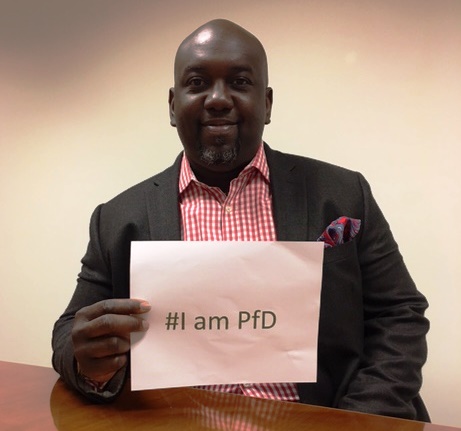
As humans, we are constantly making decisions in pursuit of fulfillment. For me, fulfillment means finding a way to serve and give back in a meaningful way, not just mere handouts. Partners for Development (PfD) is enabling me to achieve that. I am very lucky to be able to serve with an organization that is in alignment with my values and principles. My employer, the National Cooperative Bank (NCB), a mission-driven organization, also supports PfD. Lanre Ayedun, an amazing friend, past PfD employee, and current PfD Board member, introduced me to PfD and all the good work that PfD does. And I am so glad that she did.
 It’s impossible to pinpoint just one aspect of what PfD does as most impressive. How do you choose between nutrition training or capacity building or training and micro-credit or women’s empowerment or scholarships? That said, the common thread that ties all of PfD’s programs together is the inclusion of local partners in all aspects of their work. That, combined with the dedication and drive of staff, is what sets PfD apart from the others. It’s why I support PfD and why I think you should too.
It’s impossible to pinpoint just one aspect of what PfD does as most impressive. How do you choose between nutrition training or capacity building or training and micro-credit or women’s empowerment or scholarships? That said, the common thread that ties all of PfD’s programs together is the inclusion of local partners in all aspects of their work. That, combined with the dedication and drive of staff, is what sets PfD apart from the others. It’s why I support PfD and why I think you should too.
PfD’s commitment to development through training, capacity building, and overall empowerment is both sustainable and effective. I am passionate about the fact that PfD does not give fish but teaches people how to fish and then provides the resources needed to fish. PfD gives micro-credit to individuals through local partners thereby creating several levels of empowerment. For example, PfD and it’s partners are empowering women entrepreneurs: an investment that benefits families, communities, and future generations.
Should you become a PfD supporter? From my perspective, supporting PfD is the right choice for anyone that wants to make a difference in the world. Become a partner for development – take the step and contribute today. All of our donations combined will make a difference – it’ll help send a girl to school, provide clean water for a community, and prevent malaria in a village.
Put your money where your heart is. #IamPfD, are you?
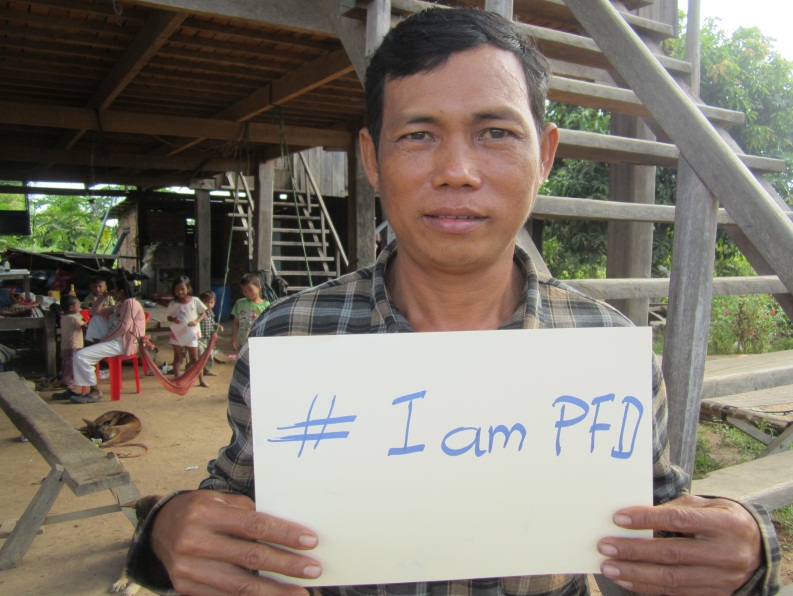
I first learned about PfD when PfD conducted malaria event and malaria education activity in my village using mobile video show. PfD also conducted many other community programs and training such as WASH, nutrition, child survival, agriculture, and chicken raising in my community. In 2013, PfD selected and trained me as Mobile Malaria Worker where I gained the knowledge and skills to provide malaria health education, diagnosis and treatment to my community members.
I am so proud to do this volunteer work.
 I have gained a lot of recognition and respect from the community members, my family, health center staff and the local authorities. I was so impressed with the malaria education activity; it informed and educated me and the community members on how to protect ourselves from malaria and where we can seek treatment when we are infected. Because I live in a malaria endemic village with lack of clean water, I am particularly passionate about malaria and WASH program of PfD’s work.
I have gained a lot of recognition and respect from the community members, my family, health center staff and the local authorities. I was so impressed with the malaria education activity; it informed and educated me and the community members on how to protect ourselves from malaria and where we can seek treatment when we are infected. Because I live in a malaria endemic village with lack of clean water, I am particularly passionate about malaria and WASH program of PfD’s work.
Our work saved our lives.
I think others should join the PfD family because PfD is the oldest NGO in Kratie Province in Cambodia and is implementing community development work to improve the quality and save lives of community members, particularly the vulnerable ones.
Throughout all of December we will be sharing stories from our staff, board, partners, and others from around the globe. We can’t wait to share all of the hopeful, engaging, and positive stories from our work. We will be using the hashtag #IamPfD on Facebook, Twitter and LinkedIn.

Be sure to share the posts that you find engaging and inspiring with friends and family and don’t forget to donate and take an #unselfie of you making a donation and share it with us and use the #IamPfD for a chance to win prizes from PfD.
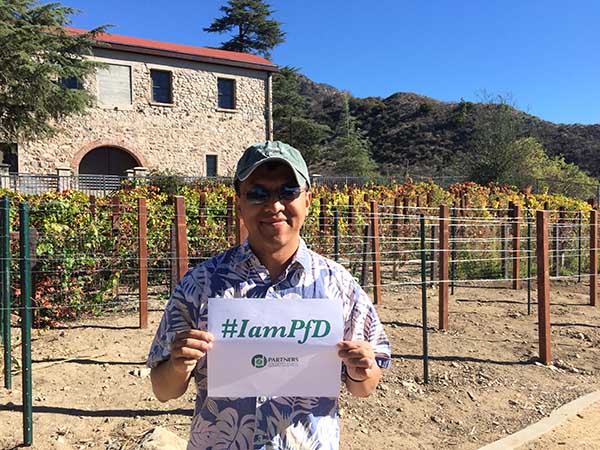

Partners for Development (PfD) came to my attention in 2011 when the PfD Board Chair wrote to me after watching myTED Talk about “Escaping the Khmer Rouge” (see below). At the time I taught at the US Naval Postgraduate School. The connection was that PfD had long worked in Cambodia since the early 1990s, when the country emerged from conflict following the Paris Peace Accords of 1991. It was fitting that someone like myself, a refugee from Cambodia who escaped thanks to my late mother’s cunning and determination in 1976, one year into the reign of the Khmer Rouge, would go on to work at the World Bank and the United Nations Development Programme. But what’s even more interesting is that after years of working for international bureaucracies, I became a scholar and critic of traditional development assistance and came to see the important work that PfD does working with vulnerable and underserved populations in developing countries to improve their quality of life.
I joined PfD’s Board in 2013, the same year I published Aid Dependence in Cambodia: How Foreign Assistance Undermines Democracy. Earlier this year, I even gave a book talk at PfD headquarters. Be sure to join our mailing list to be invited to future events like these.
PfD is not afraid of introspection and looking at what works, what doesn’t, and why. I could already see the importance of PfD’s work in 2012 when, as a Trustee of the Nathan Cummings Foundation, I arranged a large Board Recommended Grant for PfD.
Indeed, it’s a pleasure to work with PfD and to serve as a Trustee; the team is small and responsive, squeezing the most value out of your dollars for maximum impact in the field. Partners for Development isn’t just a name, it’s a philosophy that gives the greatest importance to the role of partners in every aspect of our work. This includes a deep commitment to involving local counterparts in needs assessments, program design, and implementation.
I’m in, and I think you should be too. Donate to PfD today!
In Partnership,
Sophal Ear, PhD
Associate Professor, Diplomacy & World Affairs
OXY | Occidental College, Los Angeles, California
Aid Dependence in Cambodia: How Foreign Assistance Undermines Democracy (Columbia University Press, 2013)
The Hungry Dragon: How China’s Resources Quest is Reshaping the World (Routledge, 2013) with S. Burgos
Throughout all of December we will be sharing stories from our staff, board, partners, and others from around the globe. We can’t wait to share all of the hopeful, engaging, and positive stories from our work. We will be using the hashtag #IamPfD on Facebook, Twitter and LinkedIn.

Be sure to share the posts that you find engaging and inspiring with friends and family and don’t forget to donate and take an #unselfie of you making a donation and share it with us and use the #IamPfD for a chance to win prizes from PfD.
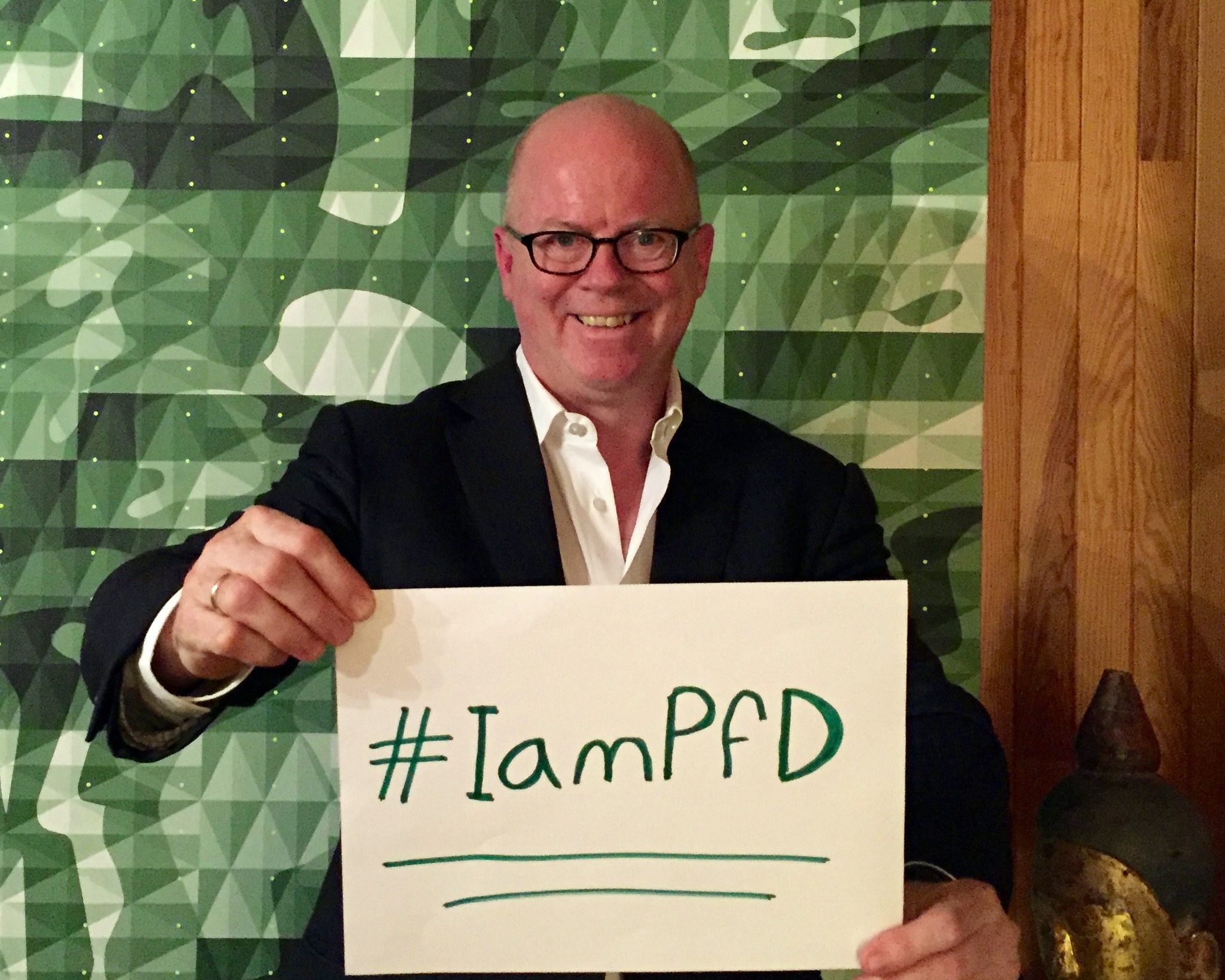
Greetings from Geneva,
My journey with Partners for Development (PfD) has allowed me to see the organization from the inside out; therefore, I wanted to reach out to you and share my story. I have been working in the relief and development field for over 25 years and had the privilege of working with PfD from 1994 to 2002. I served at their headquarters and in two countries (Somalia and Cambodia) and several years ago I was elected to the Board of Trustees. Though my role has changed, my dedication and resolve for PfD has not. I encourage you to get to know the organization better and I have no doubt that you will come to love and support the organization in the same ways that I have.
My friends and colleagues often ask why I am so gung-ho about PfD. PfD’s tendency to work “off the tarmac” in oftentimes remote and unforgotten parts of the world sets them apart. When I served as PfD’s Country Director in Cambodia, our community health and development activities focused on the distant, difficult to access provinces in the Northeast. Nearly all our staff and resources were dedicated to serving these provinces and PfD teams were primarily comprised of people from these provinces. Many of the communities in which PfD worked were accessible only by long, arduous motorbike trips. Fun fact: PfD was the first major distributor of mosquito nets in the region.
PfD’s flat hierarchy and the small but dedicated headquarters staff make them nimble and extremely responsive to the field teams and the communities in which they work. Did you know that PfD’s Silver Spring office operates with a team of 6? I like the fact that a technical support officer in Nigeria can send an email to PfD’s Executive Director and expect a timely response from him. There is little to no bureaucracy and that is how I know my donation has the greatest impact.
I am proud to be formally affiliated with PfD and urge you to learn more about how YOU can support us!
Thank you,
Michael Chommie
Geneva

Throughout all of December we will be sharing stories from our staff, board, partners, and others from around the globe. We can’t wait to share all of the hopeful, engaging, and positive stories from our work. We will be using the hashtag #IamPfD on Facebook, Twitter and LinkedIn.

Be sure to share the posts that you find engaging and inspiring with friends and family and don’t forget to donate and take an #unselfie of you making a donation and share it with us and use the #IamPfD for a chance to win prizes from PfD.
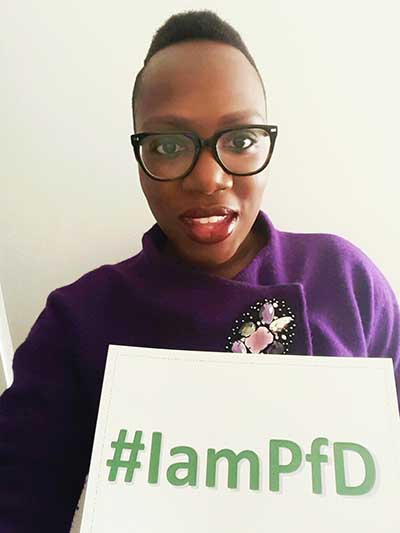
When you are a young international student who has just discovered that your liberal arts undergraduate degree won’t feed you, life is very complicated. That was me, 12 years ago. I had just finished a bachelor’s degree in Psychology and realized that I was not employable. I desperately wanted to make a difference in the world, to help people. As naïve as that sounded, even to me, I knew that I wouldn’t be able to do that without some tangible skills and a lot more experience under my belt. A friend suggested I apply for an internship at the company she worked for, Partners for Development. That was in 2005. Over the last 10 years, PfD has become an integral part of my life, career, and passion.
 I started off in the often thankless job of being an intern—except at PfD it wasn’t thankless. Every day I felt that my work was meaningful, appreciated, and valued—whether I was doing desk review for a proposal, cleaning up data from our programs, or copy editing a report. I was given the opportunity to travel to field programs in Nigeria, Bosnia, and Cambodia; I presented on my travels to the Board of Trustees and got to give them my recommendations on possible next steps; I pulled all-nighters with PfD staff getting proposal documents submission-ready.
I started off in the often thankless job of being an intern—except at PfD it wasn’t thankless. Every day I felt that my work was meaningful, appreciated, and valued—whether I was doing desk review for a proposal, cleaning up data from our programs, or copy editing a report. I was given the opportunity to travel to field programs in Nigeria, Bosnia, and Cambodia; I presented on my travels to the Board of Trustees and got to give them my recommendations on possible next steps; I pulled all-nighters with PfD staff getting proposal documents submission-ready.
I was very excited in 2006 when I was able to lead a team of fellow graduate students to do a review of PfD’s integrated microfinance and reproductive health program in Nigeria. To this day, my friends and I still talk about the stories of the women that we met in rural villages, who told us what they had learned in their microcredit groups, and how the money they had jointly saved was making a brighter future a reality for their households. And I have countless other such stories from my work with PfD. I know, personally, that when we talk about the local impacts that PfD’s programs have—there are real people and real lives that have been pointed in a better direction because of PfD.
I went on to work at PfD headquarters for two more years before moving to another organization, but I stayed in touch, hoping I would find a sustained way to stay engaged with the organization. Three years ago I was invited to join the Board of Trustees, which I accepted with great pride.
There are many compelling reasons to support PfD—the programs are solid, the management is efficient, the impacts are real. But most of all, PfD believes in people—be they interns, local staff, or program beneficiaries; and in the end, that is the kind of organization that I want to be associated with. PfD made me the international development professional that I am. PfD trained me to do rigorous work that respects the people I am working for. PfD taught me how to enjoy working with a diverse group of people, and to invest in them. PfD showed me good development that empowers local communities and magnifies local solutions. PfD showed me what it means to see value in a young Nigerian girl who just wanted to make a difference in the world. #IamPfD
Throughout all of December we will be sharing stories from our staff, board, partners, and others from around the globe. We can’t wait to share all of the hopeful, engaging, and positive stories from our work. We will be using the hashtag #IamPfD on Facebook, Twitter and LinkedIn.

Be sure to share the posts that you find engaging and inspiring with friends and family and don’t forget to donate and take an #unselfie of you making a donation and share it with us and use the #IamPfD for a chance to win prizes from PfD.

Today we mark the 22nd annual World Water Day. The theme: ‘Water and Sustainable Development.’ On 28 July 2010, through Resolution 64/292, the United Nations General Assembly explicitly recognized the human right to water and sanitation and acknowledged that clean drinking water and sanitation are essential to the realization of all human rights. And yet 748 million people still lack access to improved sources of drinking water (UN, 2014). Read on to find out how PFD celebrates World Water Day every day and what YOU can do to make an impact.
PFD has a long history working to improve Water, Sanitation and Hygiene (WASH) services and uses a local capacity building approach to ensure that the
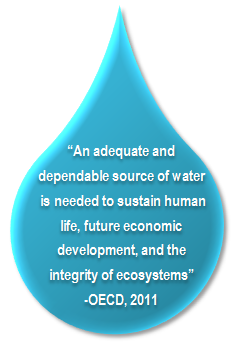 WASH programming leads to sustainable development. In Cambodia, PFD has reached over 160,000 rural residents and increased access to clean water, hygiene and sanitation services. From 1992-2002 PFD assisted in the formation of 300 Village Development Committees, installed over 5,000 community and household water points and 1,200 latrines, as well as rehabilitating 199 rural schools, establishing 64 community rice banks and creating a family gardening program involving 1,627 families.
WASH programming leads to sustainable development. In Cambodia, PFD has reached over 160,000 rural residents and increased access to clean water, hygiene and sanitation services. From 1992-2002 PFD assisted in the formation of 300 Village Development Committees, installed over 5,000 community and household water points and 1,200 latrines, as well as rehabilitating 199 rural schools, establishing 64 community rice banks and creating a family gardening program involving 1,627 families.
In partnership with UNICEF, PFD is now working in three states of Nigeria (Delta, Edo and Ekiti States) to strengthen the capacity of local Institutions and WASH committees (WASHCOM) to drive Community-Centered WASH Service Delivery. PFD has trained 163 LGA-Level facilitators on implementation of Expanded Guidelines for Local WASH Committees (WASHCOM) Formation and Training on Community WASH Management. By engaging these local committees and local organizations, such as the Rural Water Supply and Sanitation Agency (RUWASSA), PFD ensures that the communities are fully involved in their own development and enables them to create locally based solutions to meet the most pressing community needs. PFD will continue to engage with the identified WASHCOMS, delivering training and supporting the community groups to register and become connected at the federation level. Through trainings to strengthen local and regional organizational capacity, local communities will be able to share their progress and lessons learned as well as brainstorm new solutions.
Elsewhere, such as in Benin, PFD is enabling farmers to implement better irrigation techniques for their farms. Through USDA’s Growing Resources for Enhanced Agricultural Enterprises and Nutrition (GREEN), PFD has facilitated trainings on improved cultivation techniques including irrigation, and increased farmers’ access to credit to implement the trainings. Over 70% of the water withdrawn from rivers and aquifers across the world is used in agriculture, so improving irrigation techniques can help protect this precious resource (FAO).
“Approximately 10% of the global burden of disease worldwide could be prevented with improvements to water, sanitation and hygiene and better water resource management worldwide. The burden of water-related diseases falls disproportionately on developing countries and particularly on children under five, with 30% of deaths of these children attributable to inadequate access to water and sanitation” (OECD, 2011)

What can you do?
If you have read this far, you have already learned more about the importance of water for the world and its importance for sustainable development! You too can make an impact on World Water day. Continue to celebrate World Water Day by sharing on social media and tagging @Partners4dev on Twitter or following us on Facebook. Support Partners for Development WASH programming and our other projects around the globe and donatehere.

Women across the world face many challenges to equality, from access to economic, health, and education resources, to violence within communities and households. To commemorate International Women’s Day on March 8th and this year’s theme Make it Happen, PFD will be honoring the achievements of women around the globe.
Investing in women important not only because it ensures equality, but also because investing in women can produce positive externalities, expanding the impact of each dollar invested.
PFD works across the globe in three main sectors:
PFD works with and supports microfinance organizations and institutions around the world, to increase access to credit for underserved populations. In these programs, over 91% of borrowers were women. PFD has found that when these entrepreneurial women generate additional income, a large portion is reinvested into the family, often paying for school fees for their children. In Nigeria, PFD and Lift Above Poverty Organization (LAPO), a local microfinance organization, further assist women to invest in their families by offering to fund scholarships to daughters of women microfinance clients. According to the World Bank, one additional year of education for girls results in lower infant mortality and higher future incomes. By funding scholarships for girls, PFD and LAPO are also investing in future generations.
On International Women’s Day and always we honor these women.
Health 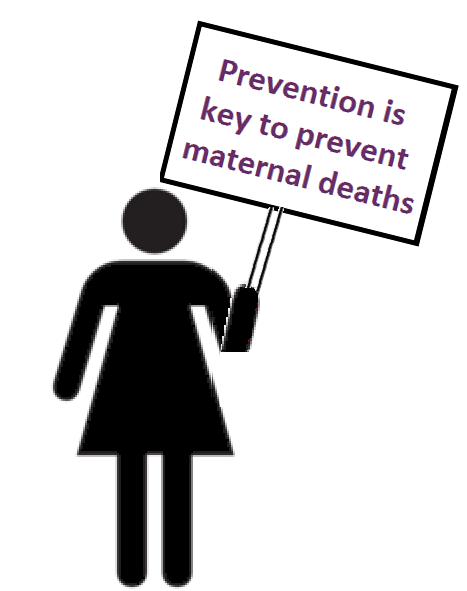 PFD trains community health volunteers to spread health information within their communities. Women who receive this training not only are able to implement changes for themselves, but they also can implement healthier practices for their families. The women are trained to spread the information in the communities and by reaching out to other women, can indirectly reach their families. In Cambodia, for instance, from 2012-2014, PFD trained over 1,500 village health volunteers in malaria health education, a majority of whom were women. In 2013, there were almost 300,000 maternal deaths worldwide related to pregnancy and childbirth. PFD works to prevent deaths by increasing access to skilled health services. In 2013 in Nigeria, with the support of PFD and local partners, 45,501 women attended at least one antenatal care visit and 19,483 women were assisted by skilled delivery attendants during childbirth.
PFD trains community health volunteers to spread health information within their communities. Women who receive this training not only are able to implement changes for themselves, but they also can implement healthier practices for their families. The women are trained to spread the information in the communities and by reaching out to other women, can indirectly reach their families. In Cambodia, for instance, from 2012-2014, PFD trained over 1,500 village health volunteers in malaria health education, a majority of whom were women. In 2013, there were almost 300,000 maternal deaths worldwide related to pregnancy and childbirth. PFD works to prevent deaths by increasing access to skilled health services. In 2013 in Nigeria, with the support of PFD and local partners, 45,501 women attended at least one antenatal care visit and 19,483 women were assisted by skilled delivery attendants during childbirth.
USAID reported in its 2012 “Gender Equality and Female Empowerment Policy” that ensuring women farmers have the same access to land, technology, and credit, crop yields can be increased “as much as 30 percent and feed an additional 150 million people”. In Benin, PFD is implementing USDA’s Growing Resources for Enhanced Agricultural Enterprises and Nutrition (GREEN). GREEN Project is working with farmers associations to increase farm revenues and productivity by building knowledge through trainings, providing information on markets and price information, and increasing access to credit. In 2013 and 2014, through GREEN, PFD and its partners were able to reach over 48,413 farmers, around half of whom were women, with trainings on farming techniques, markets and value chains, and on business development skills. Additionally, PFD integrated its micro-credit methodology into GREEN, increasing access to credit to farmers so they can implement the newly learned skills. Of the 4,680 loans made to farmers, and over 2,250 of the loans were given to women.
On International Women’s Day and always we praise the hard work and perseverance of these women.
How can you Make it Happen?
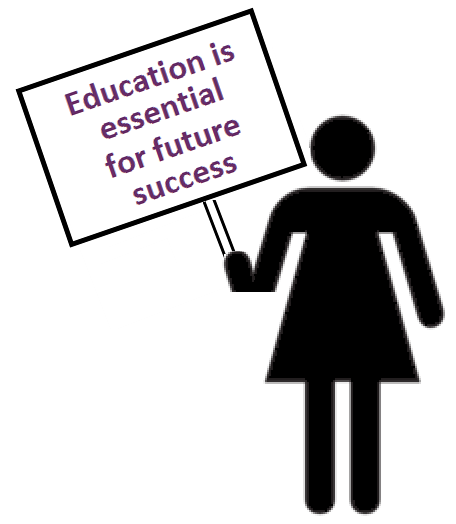
Support Girls’ Education: Help educate and empower the next generation of young women by contributing to PFD here and designating the Nigerian Scholarship fund for Girls.
Give your Support: Support PFD to develop new, innovative programs that support women and girls around the globe here.
Use your voice: Post about women’s social, economic & political achievements using the hashtag #makeithappen or #womensday! Don’t forget to also use the PFD handle @Partners4Dev so we can share your message too!
Spread the word: Repost this blog on social media to help support the movement.


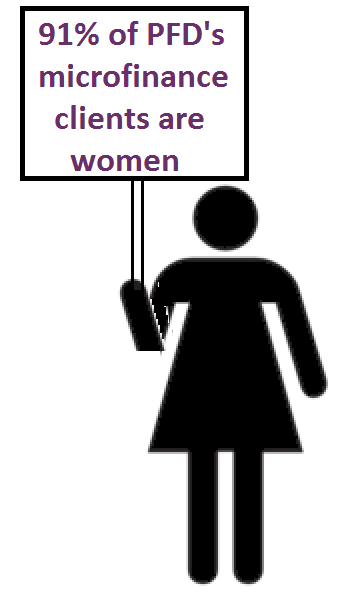 Economic Growth
Economic Growth